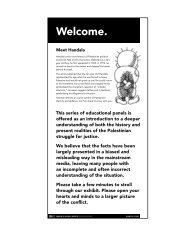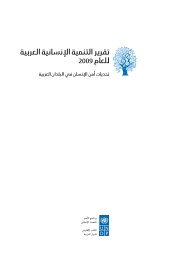arab human development report 2003 - Palestine Remembered
arab human development report 2003 - Palestine Remembered
arab human development report 2003 - Palestine Remembered
- No tags were found...
Create successful ePaper yourself
Turn your PDF publications into a flip-book with our unique Google optimized e-Paper software.
Arab citizens areincreasingly pushedaway from effectingchanges in theircountries.We have become accustomed to regardingabject submission as polite deference;obsequiousness as courtesy;sycophancy as oratory; bombast as substance;the acceptance of humiliation asmodesty; the acceptance of injustice asobedience; and the pursuit of <strong>human</strong> entitlementsas arrogance. Our invertedpower, which sometimes coincided with thedistribution of wealth, has had an effect on themorals of societies and individuals. The pursuitof personal gain, the preference for theprivate over the public good, social and moralcorruption, the absence of honesty and accountabilityand many other illnesses, were allrelated in one way or another to a skewed distributionof power and the resulting social disparities.Justice, before all else, has been thevictim of this state of affairs.Abdul Rahman al-Kawakibi: The Character of Despotism.The emigration ofqualified Arabsconstitutes a form ofreverse <strong>development</strong>aid.system portrays the pursuit of the simplestknowledge as presumption; aspirationsfor the future as impossibledreams; courage as overreaching audacity;inspiration as folly; chivalry as aggression;free speech as insolence andfree thinking as heresy.The oil boom also played its role in erodinga number of values and societal incentivesthat would have been helpful in enhancingcreativity and the acquisition and diffusion ofknowledge. With the spread of negative valuesduring that period, creative abilities were neglected,and knowledge lost its significance for<strong>human</strong> <strong>development</strong>. The social standing ofscientists, educated people and intellectualsfell. Social value was measured by the criteriaof money and fortune, regardless of how thosefortunes were gained. Proprietorship and possessionreplaced knowledge and intellectualism.Perhaps worst of all, the values ofindependence, freedom and the importance ofa critical mind were also buried.Repression and marginalisation contributedto blunt the desire for achievement,happiness and commitment. As a result, indifference,political apathy and a sense of futilityare becoming dangerously common amongbroad segments of the populace. Arab citizensare increasingly pushed away from effectingchanges in their countries.The Report calls on the state, civil society,cultural and mass media institutions, enlightenedintellectuals and the public at large toplant those values that encourage action andinnovation in the political, social and economicspheres. 'Reforming the mind' is indeeda significant requirement for Arab culture, yet'reforming action' is equally urgent.A centrifugal economic, social and politicalenvironment in the region, coupled withcentripetal factors in other countries led tothe growing phenomenon of an Arab braindrain. The emigration of qualified Arabs constitutesa form of reverse <strong>development</strong> aidsince receiving countries evidently benefitfrom Arab investments in training and educatingtheir citizens. More significant, however, isthe opportunity cost of high levels of skilledoutflows: the lost potential contribution ofemigrants to knowledge and <strong>development</strong> intheir countries of origin. This double loss callsfor serious action to minimise its dangers:firstly by tapping the expertise and knowledgeof the Arab Diaspora abroad, and secondly byproviding Arab expatriates with incentives toreturn, either on temporary assignments or forgood, to their countries of origin, carrying a<strong>human</strong> capital much larger than that they hadmigrated with. This can be achieved only bylaunching a serious project for <strong>human</strong> <strong>development</strong>that would attract highly qualified migrantsback temporarily or permanently onproductive and personally fulfilling assignmentsto serve their countries.The Arab Brain DrainRoughly 25% of 300,000 first degree graduatesfrom Arab universities in 1995/96 emigrated.Between 1998 and 2000 more than 15,000 Arabdoctors migrated.Data provided by A.B. Zahlan.Unlike the case of Arab culture, theanalysis of Arab social and economic structuresreveals ingrained obstacles to knowledgeacquisition in the Arab world. Only by overcomingthose obstacles through reform can aknowledge society be developed.THE POLITICAL CONTEXT:Oppression, Knowledge and DevelopmentPolitical obstacles to knowledge acquisition,as the Report argues, are even more severe inArab countries than those posed by theirsocio-economic structures, which are in turnseen to be more obstructive than any featuresof culture.Political power plays a key role in directingknowledge and influencing its <strong>development</strong>. It10 ARAB HUMAN DEVELOPMENT REPORT <strong>2003</strong>







